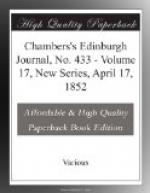The purchase of forty-shilling freeholds has lately been put forward as a method of investing money by the working-classes. It is beyond our province to speak of the political aims of this form of investment. We can recognise a certain good in giving to a working-man the feeling, that he is the proprietor of a house or small portion of land yielding (along with the franchise in England) a rent of forty shillings per annum; but, at the same time, we recognise a corresponding evil, and we should be shrinking from our duty if we did not mention it in distinct terms. In those localities where operatives and others can reckon on constant remunerative employment, it may prove a real service in many ways for them to buy a house instead of renting one; indeed, we should highly recommend them to become the proprietors of the dwellings which they occupy. But in places where workmen possess no such assurance or reasonable prospect of employment, we would as earnestly dissuade them from taking a step of this kind. The capital of a working-man—that on which he must place his dependence—is his labour; and this labour he ought to be in a position to dispose of to the best advantage. On this account, he requires, as a general rule, to hold himself in readiness to go wherever his labour is in demand. Of all men, he has the most cause to be a citizen of the world. He may find it his interest to remove to localities hundreds of miles off; and therefore the fewer obstructions to his movements, the better. Heritable property is a fixture. A man cannot take it with him, and the sale of it, even when time is permitted to seek out a purchaser, is attended with expense and difficulty. No doubt the transfer of such property might and ought to be vastly lowered in cost; but not until this is done, will it be time




